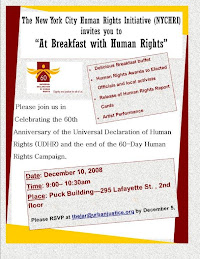Monday, October 27, 2008
LGBT Rights as Human Rights
By Pauline Park
There was a time not long ago when leading international human rights organizations such as Amnesty International and Human Rights Watch (HRW) did not recognize lesbian, gay, bisexual, and transgendered (LGBT) people as being a part of their organizational mission and would not include LGBT-specific initiatives in their programmatic work. Hence, the formation of Amnesty International Members for Lesbian & Gay Concerns (AIMLGC) in the early 1990s to pressure Amnesty International to add issues of sexual orientation and gender identity and gender expression to AI's mission and work. In the same time period, other LGBT activists decided to establish a stand-alone, LGBT-specific human rights organization, founding the International Gay and Lesbian Human Rights Commission (IGLHRC) in 1990.
Now, in addition to IGLHRC, Amnesty and HRW both have funded full-time staff members working on LGBT issues. Amnesty USA houses the OUTfront! LGBT Human Rights program in New York City and HRW also has an extensive LGBT human rights program based in its New York headquarters, while IGLHRC, also based in New York, continues to pursue the mission for which it was founded. But if leading international human rights organizations such as Amnesty and HRW now incorporate LGBT issues in their human rights work, progress on the ground has been slower, as many human rights organizations in many countries around the world still do not include LGBT issues in their work.
At the same time, the situation in the United States reflects the paradoxes of identity-based rights work. On the one hand, the LGBT movement has made enormous progress since 1969, when LGBT people rioted in response to a police raid at the Stonewall Inn in Manhattan's Greenwich Village. Now, well over a hundred jurisdictions throughout the United States include gender identity and expression in their non-discrimination laws and even more include sexual orientation. The LGBT community is well-organized in many cities and states and 'gay votes' are eagerly sought by candidates running for office in many of them.
However, despite the fact that so many non-discrimination statutes include sexual orientation and gender identity and expression, these 'human rights' ordinances all too often are really only civil rights laws -- limited to protecting individuals from discrimination in employment, housing, and public accommodations, but not extending to social, economic, cultural, and environmental rights. In fact, the common misunderstanding among Americans is that 'civil rights' refers to legal rights in the United States and that 'human rights' refers to other countries around the world. The US Human Rights Network was founded to bring the language and principles of human rights into public discourse in the United States and to broaden the agenda of the civil rights movement in this country.
Unfortunately, some LGBT activists in the United States tend to reinforce the misconception by pursuing on a narrow civil rights agenda that is focused only on juridical rights, while most LGBT activists here all but ignore human rights initiatives -- including even LGBT rights work -- abroad. With the exception of Amnesty OUTfront, HRW's LGBT human rights program, IGLHRC, and Immigration Equality, few LGBT rights organizations in the United States connect with LGBT activists working overseas or attempt to incorporate a broader conception of human rights into their work.
The New York Association for Gender Rights Advocacy (NYAGRA) is a statewide transgender rights organization founded in 1998. NYAGRA's mission is to advocate on behalf of freedom of gender identity and gender expression for all. At the heart of NYAGRA's work is a broad-based conception that is not limited to juridical rights but also includes the social, economic, cultural, and environmental rights that are crucial to the full enjoyment of human rights by all New Yorkers, including the transgendered and gender-variant. To that end, NYAGRA joined the New York City Human Rights Initiative (NYC HRI) as a founding member as well as the US Human Rights Network and the Equality Federation (formerly the Federation of Statewide LGBT Advocacy Organizations). NYAGRA is also a co-founding member of the New York State Dignity for All Students Coalition that is spearheading safe schools legislation pending in the state legislature and co-founded the New York City Dignity in All Schools Act (DASA) Coalition that succeeded in getting safe schools legislation enacted at the local level. NYAGRA joined the New York Civil Liberties Union (NYCLU) in co-founding the New York City Dignity in Action Coalition (the successor to the NYC DASA Coalition) to ensure full implementation of the New York City Dignity in All Schools Act (enacted by the City Council in 2004) and also joined the New York Alliance Against the Real ID Act (NYAARIDA), a statewide coalition of organizations coordinated by the NYCLU and committed to blocking implementation of the real ID Act in New York.
In short, NYAGRA works in coalition with other civil rights, human rights, and social justice organizations to pursue a broader and progressive vision of social justice and social change. NYAGRA's work within the New York City Human Rights Initiative is a crucial component of that agenda.
Pauline Park is chair of the New York Association for Gender Rights Advocacy (NYAGRA); she led the campaign for the transgender rights law enacted by the New York City Council in 2002.
http://www.nyagra.com
Subscribe to:
Post Comments (Atom)




2 comments:
it is so important that more human rights organizations push for trans-inclusion. many of the mainstream larger lgbt orgs. have pushed this to the wayside. check out www.unitedenda.org
great!!!!!!!!!!!!!!!!
Post a Comment